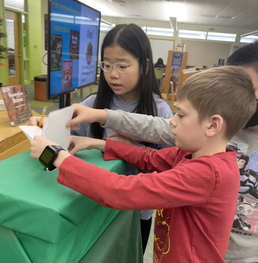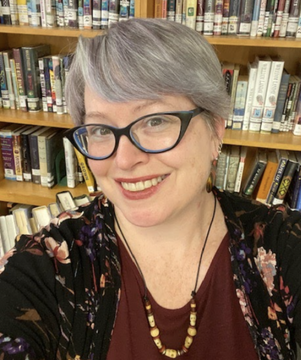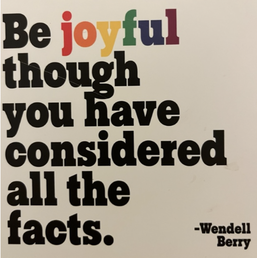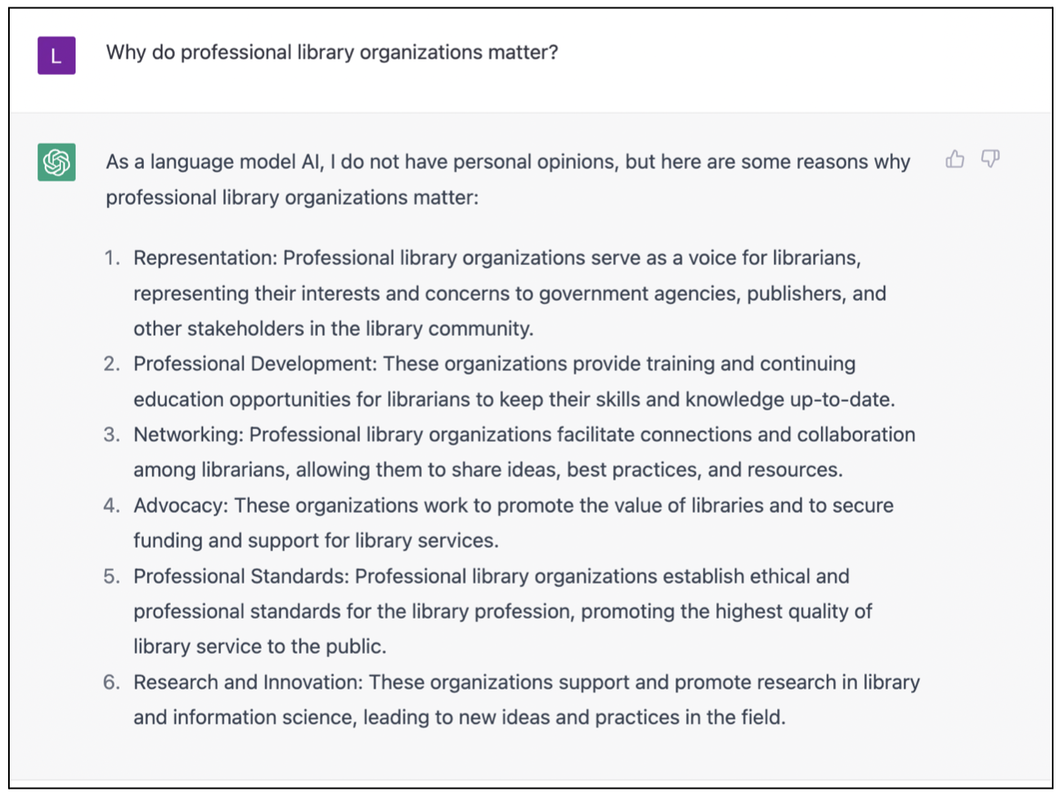|
MSLA President Jen Varney is the Librarian at the Dr. Martin Luther King, Jr. School in Cambridge, MA This past December in the rush of holiday shopping, I spotted a magnet with the quote “Be joyful though you have considered all the facts. - Wendell Berry.” The words resonated with me and I bought it, brought it home, and slipped it into my own stocking (as you do).
0 Comments
Luke Steere is the librarian at Wilson Middle School in Natick, MA Below is a screenshot of cold, hard, but fertile ground: If you haven’t seen something like this yet, it’s ChatGPT’s submission interface. You sign up and ask questions which are generated by an artificial intelligence language bot. In addition to my editing duties, I am sitting on the Strategic Plan Committee and, in Natick where I work, I have been listening in on talk about the impact of ChatGPT.
Kendall Boninti is the Instructional Technology Specialist at Cambridge Rindge & Latin School in Cambridge, MA Do you teach copyright and fair use to your students? I’m ashamed to admit it, but until a few years ago, I avoided copyright altogether… in my lessons, in my conversations. It just seemed like such a downer. A bunch of negative rules that restrict students' ability to do fun innovative things with music, media, and art. That was until Alida Hanson, the Library Teacher at Weston High School, recommended that I read the book Copyright Clarity: How Fair Use Supports Digital Learning by Renee Hobbs. The book was published a while back, but the information is still relevant today. Hobbs' book opened my eyes to how big media companies intentionally mislead educators into being ultraconservative in the way they practice and teach fair use and copyright. Have you ever seen or used one of those copyright checklists that lays out the “rules” of fair use (i.e. you can only use a certain percentage of a song or video)? Those checklists were often born out of agreements between media companies and assorted educator groups to intentionally limit students’ rights. Not surprisingly these agreements are not based in actual law (Hobbs, 29).
Courtney Ahearn is the librarian at the Annie L. Sargent Elementary School in North Andover, MA
Working in a school library, especially one that serves students who are just learning to navigate the wide world of literature independently, can be difficult all on its own. Throw in the current national climate regarding book challenges and bans, and you’ve got a minefield of issues and potential problems.
The ALA reported in their 2021 State of America’s Libraries Special Report that 44% of the 729 challenges (affecting over 1,000 individual titles) were reported from school libraries (American Library Association, p9). At least a few of those challenges were against books housed in elementary school collections, such as Drama by Raina Telgemeier or Melissa by Alex Gino (Friedman, 2023). While Massachusetts has not seen the kind of widespread bans that other states have enacted, it is important that elementary librarians across our state be aware of what is at stake— and, more importantly, what can be done. Academic Column: Project S.L.I.D.E.: The School Librarian Investigation - Decline or Evolution?2/14/2023
Deeth Ellis is the Head Librarian at Boston Latin School in Boston, MA, and a Doctoral Student, School of Library Science, Simmons University
Project S.L.I.D.E. is a three-year national study led by researchers Deb Kachel, Antioch University, and Keith Curry Lance, Ph.D, RSL Research Group. The study is funded by the Institute of Museum & Library Services (IMLS), an independent federal agency that offers grants to museums and libraries for research and policy and program development. Lance and Kachel are examining the decrease in librarian positions across the United States by using school staffing data from 2010 to 2019 provided by the National Center for Education Statistics (NCES). The data tracks libraries at district, state, and national levels. Project S.L.I.D.E.'s output, a document called “Perspectives”, only uses data to 2019, but 2020-2021 data has been added to the Project’s tools and is considered in recent reports.
Liza Halley is the Library Teacher at Plympton Elementary School in Waltham, MA I want to start off discussing some language I use when talking about the medium of comics. People often ask me: What’s the difference between a graphic novel and a comic? Here’s a simple boilerplate to explain: Comics is a good catch-all term to use, graphic novels often just refers to a bunch of comics bound together.
Francesca Mellin is the Head Librarian at The Pike School in Andover, MA

On Monday, January 30, I - like many of you - was glued to the live stream of the American Library Association’s Youth Media Awards, cheering along with the live audience for many of my favorites. I was also putting the final touches on the library’s transformation into an election center for a new collaborative venture, Pike’s inaugural Mock Sibert Award.
During the course of this year, I’ve been excited to re-connect with teachers to support curriculum, especially because a new built-in meeting structure with teaching teams has created consistent co-planning time. Gillian Bartoo is the District Cataloger for Cambridge Public Schools in Cambridge, MA Let’s talk about classifying graphic books. Usually when somebody says to me that their graphics cataloging is a mess what they usually mean is the classifications, or call numbers, are a mess: some are classed as 741.5, some as FIC, and some with other Dewey numbers. Raina Telgemeier’s Smile is in FIC or 741.5 (“work of imagination, comic book”) but Sisters is at 306.8 (“family relationships”). Nathan Hale’s Hazardous Tales are in FIC, 741.5 and 973. El Deafo is cataloged as a biography. Maus I is at 741.5, because it is assigned as a classic text of comic book study, but Maus II is at 940.53 (“World War II”). Every Batman has a different cutter. Manga has an extended 741.5952 call number. Early reader graphics are split between Early Reader and Graphic collections and have both E and 741.5 call numbers. How does anyone get this stuff to sit together in a logical way?
Colleen Simpson is the Library Media Specialist at Lester J. Gates Middle School in Scituate, MA
I have a confession, I love research. I mean I really love discovering the answer to something, but, even more, I love the hunt. I love the process. I love finding an answer for myself and for other people. I even love the humbling feeling of learning that what I thought I knew was either incomplete or totally incorrect. And what I love most of all: there is always more to discover about any subject.
This may seem obvious. One typically assumes that librarians like research, but like most educators I think a lot about my own motivations when considering the student’s motivation. This balance is particularly challenging in middle school when there is less extrinsic motivation than high school. As a staff we are regularly talking about what drives a student, where their interests lie and how we can harness that motivation into the classroom. Tracey Newman is the Library Media Specialist/Librarian at Scituate High School  1. What's your name, title and school? Tracey Newman, Library Media Specialist/Librarian at Scituate High School 2. How did you come to librarianship? The long way! It seems so cliche, but I’ve always been a book-lover, and enjoyed organizing my various collections, including books and comics. My undergrad degree is in English, and I worked a few English-related jobs, such as one of the founding editors of the indie paper now known as Dig Boston, and in educational publishing editorial at Houghton Mifflin Harcourt and Educators Publishing Service. JoAnne Vernacchio, my high school English teacher, gets credit for pushing me to become a teacher, when I saw her at a friend’s wedding in 2008. When the Ed Pub industry was consolidating and changing, I passed the licensure tests as a backup plan. After my second child arrived, our family moved to the South Shore, where I grew up–the commute to Cambridge really wore me down. I took a job as the secretary to the Coordinator of Technology and Library Media in Plymouth. Going to conferences and meetings with librarians and tech specialists gave me fresh direction; that’s when I applied to the Library Media K-12 program at Salem State. Switching gears to teach and work as a para for ELA and in the Library at Hingham High in 2015 was a fantastic experience, and they were wonderful people to work with. In January of 2021, I became a long-term substitute Librarian for grades 3-5 in Duxbury, and then got the position at Scituate High. I still feel like a new librarian, though! 3. How would you explain the importance of your role to a nonlibrarian? The other day I described weeding and curation to a new staff member, who admitted those were things they’d never considered. Most people don’t understand that libraries need curating, especially when the collection has books that are outdated or damaged. More books does not equal a great library. On the flip side, people are surprised we still have books, too. Librarians manage a whole space and everything in it: people, books, tech, events. Especially in high school, the library is a gathering place before, during, and after school. My job is as much teaching kids expected behavior in a shared space as it is teaching how to access online resources or find a book to read for pleasure. Dedicated, licensed Library Media Specialists and Librarians are crucial in elementary and middle school, too. We bridge the gap for reading and research in ways that most classroom teachers or digital literacy and reading specialists don’t have in their wheelhouses. Older students get their information from the internet and social media, and it’s important to keep up with those trends. Our information needs to stay current in so many ways. 4. What are you working on right now? A Lego and puzzle drive is currently running to revive a mini makerspace for some creative brain breaks. After not having a full-time librarian for a few years, there’s some catch-up, maintenance, and cleaning-up, plus future planning in the pipeline. The catalog in Destiny needs lots of love, along with weeding in the fiction section and 300s. When the library was remodeled a couple of years ago, all the furniture— including any shelf not attached to a wall— was thrown away. The two-fold work of updating the collection to fit on the shelves that are left plus planning how sections of books will eventually be configured is a fun challenge. 5. What is going well? Having a teacher in the library all day has a positive impact on students and staff, and re-establishing systems and routines was needed. Even though I don’t teach any dedicated classes, I see everybody, and I’m here to help, whether that’s lending out Chromebooks, finding a book, helping to print, citing text correctly, knowing where all the study halls are, or having lots of supplies for last-minute projects. I’m on pretty much all day. 6. What is the most challenging thing so far? Being on pretty much all day! But that’s a good challenge. Changing the culture from when teachers had to find workarounds or adapted to not having as much library support is challenging too— but that culture is slowly turning around. 7. What's the most unexpected thing about your new job? How much students want to be in the library, and the even balance of who wants to hang with their pals versus those who need a quiet spot. We have a learning media commons— basically one big room with different zones— that actually works. 8. What are you reading or watching? I’m savoring Paul Tremblay’s new book, The Pallbearer’s Club, and finally reading All Boys Aren’t Blue by George M. Johnson. On Hulu, Reservation Dogs is amazing. I love the gorgeous new serial adaptation of Anne Rice’s Interview with a Vampire. 9. What do you hope the MA School Library Association can do for you? Connections, connections, connections! Learning from peers, at the conference and online, in such a specialized field, plus combining resources or finding local colleagues through MSLA is a huge benefit. Reba Tierney is the Library Teacher at Waltham High School Love is in the air! If you're reading this, Happy Valentine's Day! (Or Singles Awareness Day, if you prefer!) Scrolling through the archives, I have found the most timely piece of Forum history to share. From the January 2013 Forum, I'd like to take a moment and enjoy a throwback to Author Speed Dating. Much of the January 2013 Forum featured highlights from the upcoming 2013 MSLA Conference to be held that March. One highlight of the conference was the chance to participate in Author Speed Dating.
|
Forum NewsletterCo-Editors
|




